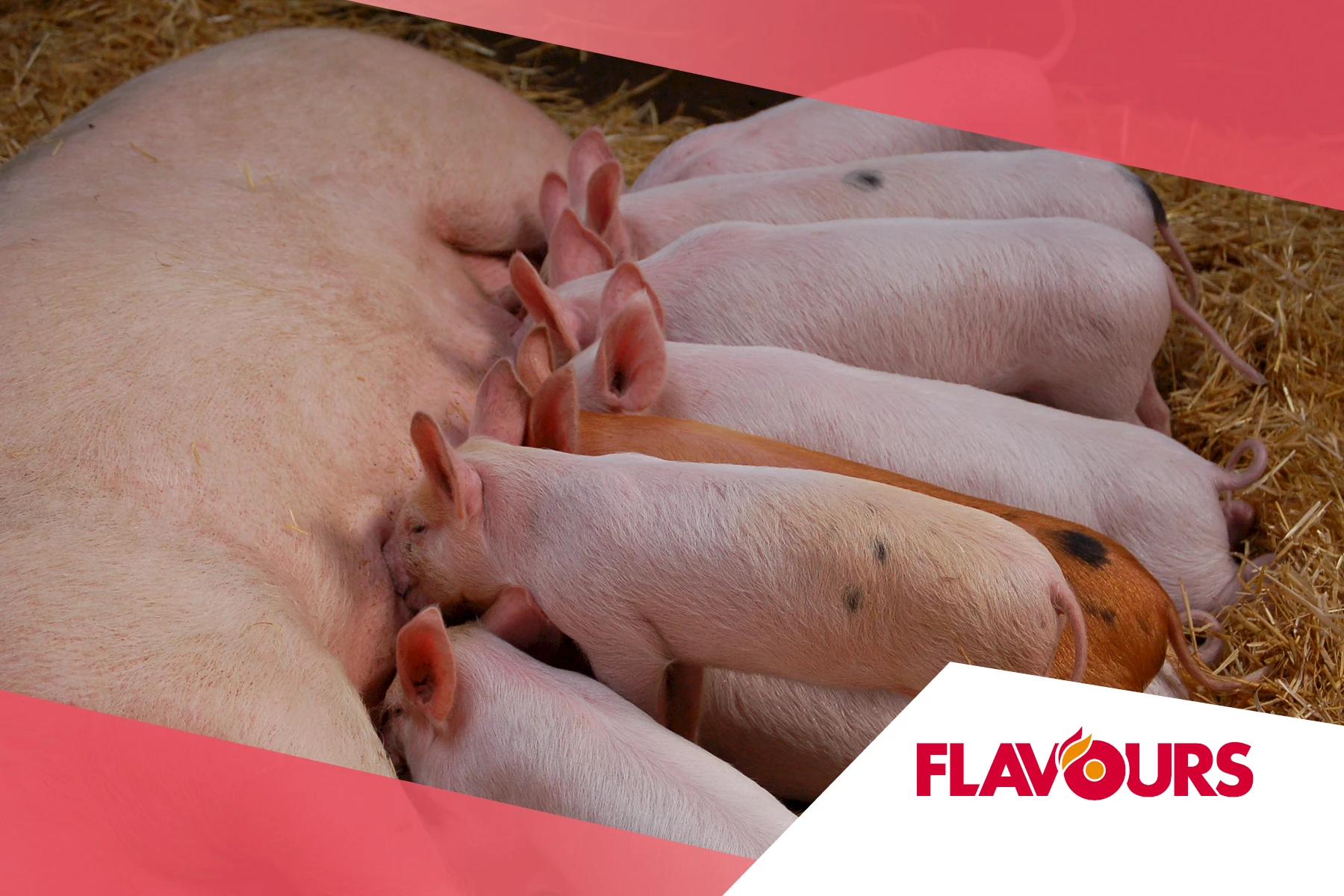
Maternal flavour imprinting refers to the process by which flavour compounds from a sow’s diet are transferred to her offspring during gestation and lactation. These compounds reach the developing piglets through the amniotic fluid before birth and through milk after birth, creating early and repeated sensory exposure.
Research, including studies by Oostindjer et al. (2009, 2010, 2011) has shown that piglets can detect and remember these maternal dietary flavours. This early exposure leads to the formation of flavour memories, influencing piglets’ postnatal flavour preferences and feed acceptance.
When the same or similar flavours are included in the piglets’ post-weaning diet, they are more likely to recognize and accept the feed. This reduces neophobia (fear of new foods), increases voluntary feed intake, and supports a smoother transition during weaning. Consequently, piglets benefit from improved growth performance and feed efficiency in the critical post-weaning phase.
Understanding maternal flavour imprinting offers valuable insights for improving animal welfare and productivity in swine production.
Bigarol® Extarom P combines intense forest honey notes with a subtle touch of vanilla. The flavour is highly potent and remains stable even under the high temperatures of pelleting processes, making it ideal for use in modern piglet diets.
In the study, the flavour was included in sow feed during both gestation and lactation phases and later continued in the post-weaning piglet diet.
The study was carried out at the well-known research facility Haus Düsse in Germany. A total of 250 piglets were assigned to five treatment groups (n = 50), housed in pens of 8 animals each. The trial lasted 29 days, beginning at an average body weight of 7.5 kg and ending at approximately 25 kg. All diets were pelleted after flavour inclusion to simulate real-world conditions.
The experimental treatments differed in flavour dosage and whether sows had been exposed to the flavour during gestation and lactation (maternal imprinting):
The trial results clearly demonstrate the benefits of flavour application – especially when combined with maternal imprinting.
Piglets fed diets supplemented with the flavour Bigarol® Extarom P showed improved performance compared to the control group, especially when maternal imprinting was applied.



Bigarol® Extarom P proves that flavour is more than a feed additive – it’s a tool for continuity, familiarity, and performance. Maternal flavour imprinting not only eases the weaning transition but unlocks the full potential of young piglets right from the start.
Oostindjer, M., Bolhuis, J.E., van den Brand, H. and B. Kemp: 2009: Prenatal Flavor Exposure Affects Flavor Recognition and Stress-Related Behavior of Piglets. Chemical Senses 34: 775-787.
Oostindjer, M., Bolhuis, J.E., van den Brand, H., Roura, E. and B. Kemp: 2010: Prenatal flavor exposure affects growth, health and behavior of newly weaned piglets. Physiology & Behavior 99: 579-586.
Oostindjer, M., Bolhuis, J.E., Simon, K., van den Brand, H. and B. Kemp: 2011: Perinatal Flavour Learning and Adaptation to Being Weaned: All the Pig Needs Is Smell. PLoS ONE 6(10):e25318.

Dr. Anne Winkler: After obtaining a Diploma in Agricultural Science, Anne pursued a Master's degree in Agricultural Science and Environmental Protection at the University of Applied Sciences in Bingen. In 2018, she earned a PhD in Agricultural Science from Martin-Luther-University Halle-Wittenberg. With her strong scientific background, Dr. Anne Winkler now brings her expertise to her role as the Global Product Manager for Flavours & Sweeteners at Phytobiotics.
Contact our experts or send us a message. We will contact you as soon as possible.